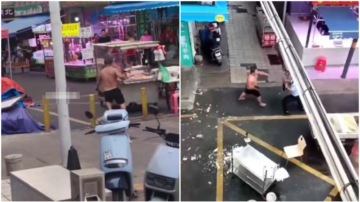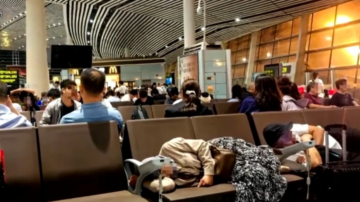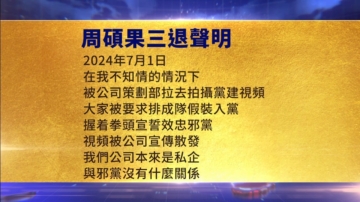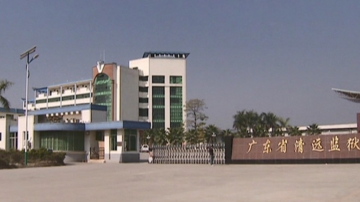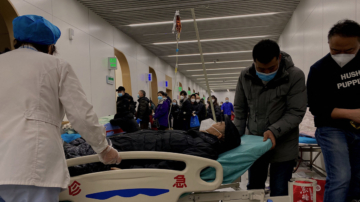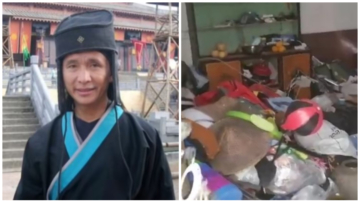【新唐人2013年12月26日讯】流亡美国的着名中国异议人士魏京生,最近在评论文章中指出,从2010年中共开始实施“保安服务管理条例”、正式承认“保镖”的合法地位以来,三年中,保镖业迅速成长,现在已经有430多万保镖。魏京生认为,保镖业迅速崛起,表明社会正处于崩溃的边缘、动荡的前夜。请看下面报导 。
魏京生12月24号在《自由亚洲电台》的特约评论中,引用大陆媒体《经济观察报》的资料指出,中国大陆现在有4000多家安保公司,保镖430多万。根据安保公司的说法,他们的客户最初是一些社会名人,后来就发展到整个富裕阶层,所以业务十分繁忙。有些公司的年收入上亿,正在考虑成为上市公司。
魏京生指出,美国即使比中国富裕得多,名人也多得多,但保镖业也没有几百万人从业;也没有几百亿的利润。
他认为,西方社会分配比较平均,并且在二战之后,各国都实行了程度不等的社会福利措施,和收入公平的原则,贫富差距维持适当,不会产生像中国现在这样严重的仇富心理;也不会产生像现在中国这么多的抢劫和绑架。
34岁的陆先生是一位亿万富翁,不久前他的好友遭绑架勒索后被杀害。出于保护人身安全的考虑,他签约20多位职业保镖,给自己和家人都配备了贴身保镖。这些保镖还要负责公关、商务、看护家庭、接送小孩等。
旅美独立评论员张健认为,其他国家都有贫富差距问题,但都没有像中国如此之大﹔其他任何发展中国家也都有仇富问题,也没有像中国如此仇富﹔而每个国家都有社会不公问题,也都没有像中国如此不公。
旅美中国社会问题研究人士张健:“保镖业的产生,其实从另一个角度,折射了中国当代现今社会,就是:中国的富人已经成了人们的罪敌,还已经变成了盘剥人民的份子。”
张健表示,人民在绝望的情况下,就会铤而走险。
其实,在中国频频发生富豪被绑架案。
浙江温州“新雅集团”的董事长郑步良,是亿万富豪,1998年,他的儿子被绑架并且被撕票杀死;2005年,内蒙古知名民营企业家云全民,9月25号遭绑架,第二天他的家人交付240万元赎金后,绑匪依然残忍的将他撕票;2011年浙江亿万富豪金某,被7名劫匪绑架勒索3500万;今年(2013年)9月,中国首富“娃娃哈”公司董事长宗庆后被人砍伤;11月,辽宁本溪女富豪被绑架勒索300万。
仅2004年,公安部公布的当年绑架案件数为3863起,远远超出世界其他国家。
魏京生的文章还指出,西方社会是用法制来保障社会公平,公正的处理社会纠纷,避免弱肉强食和不公平引起的纠纷扩大。但在中国却恰恰相反,在宪法里规定了“政党大于法律”。在现实中也是当权者的意志大于法律﹔特权阶级的权利大于法律;执法者可以随意解释法律。统治者取消了宪法和法律本身的权威,也就是取消了自己的合法性,仅仅依靠暴力执法维持。
魏京生认为,中国老百姓有遵纪守法的传统,但是经过中共几十年的现身说法式的教育,法律越来越没有权威,越来越多的人用非法的手段解决致富和报仇问题,政府也需要雇用几百万军警保护﹔官僚和富人还需要雇用保镖来保护。
作家廖祖笙撰文认为,连年几千亿的“维稳”说得严重些,就是国家在长期买凶杀人、整人和抢人……。
北京社会活动家、维权人士胡佳:“尤其政法系统的官员,他们欠的血债太多了,都是那种不公正的血债。是由欺压百姓、甚至剥夺别人自由甚至生命换来的。”
魏京生在文章最后还指出,当社会上层把人民当做待宰的羔羊对待的时候;他们自己也就成为了待宰的羔羊,这样的社会处于崩溃的边缘。特别是在有着造反和革命传统的中国社会,这就是社会动荡的前夜。
采访/朱智善 编辑/宋风 后制/孙宁
Social upheaval: The bodyguard business is booming in China
Wei Jingsheng, the famous Chinese dissident in exile, states in
his recent article that since the Security Service Management
Regulations went effective in 2010,
bodyguarding has been recognized as a profession by the
Communist regime. Within just three years, there are now more
than 4.3 million bodyguards in China.
Wei Jinsheng believes that the rise of the bodyguard business
signals that society is on the verge of collapse and the eve of
turbulence.
The following is our report.
Wei Jingsheng writes in a column for Radio Free Asia on
Dec. 24 that according to the Economic Observer's data,
there are more than 4,000 security companies, and 4.3 million
personal security guards in China.
According to the privately-owned security companies,
clients have expanded from celebrities to the wealth class.
The prosperity of business has urged some of them considering
to become listed companies.
Wei Jingsheng indicates that even though the wealthy and the
celebrities in the U.S. are far more numerous than that in China,
the bodyguard business has not flourished into an industry
worth tens of billions of profits in the U.S.
He believes that Western society is healthier in social fairness.
After WWII, disparity is relatively adequate because of
social welfare and policies leading to income distribution.
Whereas China has not done so and thus a serious psychological
resentment of the rich has developed, and consequently
many robberies and kidnappings happen in China today.
Mr. Lu is a 34 - year-old billionaire, his friend was just recently
killed after a ransom.
For personal safety, he signed a contract with more than 20
professional bodyguards for his families and himself.
The bodyguards will take care of public relations, business,
house hold chores, and the kids to-and-from schools.
Commentator Zhang Jian believes that no other country would
have as big a wealth disparity as in China.
There are also resentments against the rich in other developing
countries, but not as severe as in China.
Social injustice exists everywhere, but none as wide and deep
as in China today.
Zhang Jian, commentator: "The bodyguard business reflects
the contemporary Chinese society, where the rich have become
the criminal and the enemy for their exploitation of the people."
Zhang Jian believes that people will risk their lives under
desperate situations.
In fact, ransoms demands happen in China frequently.
Zhejiang billionaire Zheng Buliang's son was kidnapped and
killed in 1998;
Inner Mongolia entrepreneur Yun Quanmin was kidnapped on
Sept. 25, after his family delivered 2.4 million yuan ransom
the next day, he was still killed;
Zhejiang billionaire surnamed Jin was kidnapped by seven
robbers for 35 million yuan;
Hangzhou Wahaha Group CEO Zong Qinghou was attacked
in September;
A Liaoning female entrepreneur was kidnapped for three
million yuan.
In 2004 alone, there are 3,863 cases of ransom according to the
Ministry of Public Security, far beyond what the rest of the
world have encountered.
Wei Jingsheng's article also indicates that the legal system in the
West safeguards social fairness and justice and helps to restrict
disputes from worsening.
In China, however, the Constitution regulates
"the party is greater than the law."
In reality, the authorities are above the law, the privileged class
is also above the law, and law enforcers interpret the law
arbitrarily.
However, when the rulers abolish the authority of the
Constitution and the law, they also abolish its own legitimacy,
and thus rely on violence to maintain law enforcement.
Wei Jingsheng explains that the Chinese are traditionally
law-abiding.
Through decades of the Communist ruling and education,
law no longer holds its status in people.
More and more people take the illegal approach to get rich and
revenge,
consequently, the government relies on millions of
military and police to maintain the regime, and the bureaucrats
and the rich rely on bodyguards for personal security.
Writer Liao Zusheng believes that hundreds of billions of state
funds used in maintaining stability is merely a long-term contract
for killing, torture and robbery of the country.
Hu Jia, Beijing activist: "The officials of the political and
legal system, in particular, owe too much blood debt
for injustice, suppression, deprivation of people's
freedom and even lives."
Wei Jingsheng stresses in his article that when the upper social
strata treat the people as a lamb to be slaughtered, they become
the lambs themselves in a society on the brink of collapse.
In Chinese society with a history of rebellion and revolution,
it is the eve of social unrest.
Interview/ZhuZhishan Edit/SongFeng Post-Production/SunNing
魏京生12月24号在《自由亚洲电台》的特约评论中,引用大陆媒体《经济观察报》的资料指出,中国大陆现在有4000多家安保公司,保镖430多万。根据安保公司的说法,他们的客户最初是一些社会名人,后来就发展到整个富裕阶层,所以业务十分繁忙。有些公司的年收入上亿,正在考虑成为上市公司。
魏京生指出,美国即使比中国富裕得多,名人也多得多,但保镖业也没有几百万人从业;也没有几百亿的利润。
他认为,西方社会分配比较平均,并且在二战之后,各国都实行了程度不等的社会福利措施,和收入公平的原则,贫富差距维持适当,不会产生像中国现在这样严重的仇富心理;也不会产生像现在中国这么多的抢劫和绑架。
34岁的陆先生是一位亿万富翁,不久前他的好友遭绑架勒索后被杀害。出于保护人身安全的考虑,他签约20多位职业保镖,给自己和家人都配备了贴身保镖。这些保镖还要负责公关、商务、看护家庭、接送小孩等。
旅美独立评论员张健认为,其他国家都有贫富差距问题,但都没有像中国如此之大﹔其他任何发展中国家也都有仇富问题,也没有像中国如此仇富﹔而每个国家都有社会不公问题,也都没有像中国如此不公。
旅美中国社会问题研究人士张健:“保镖业的产生,其实从另一个角度,折射了中国当代现今社会,就是:中国的富人已经成了人们的罪敌,还已经变成了盘剥人民的份子。”
张健表示,人民在绝望的情况下,就会铤而走险。
其实,在中国频频发生富豪被绑架案。
浙江温州“新雅集团”的董事长郑步良,是亿万富豪,1998年,他的儿子被绑架并且被撕票杀死;2005年,内蒙古知名民营企业家云全民,9月25号遭绑架,第二天他的家人交付240万元赎金后,绑匪依然残忍的将他撕票;2011年浙江亿万富豪金某,被7名劫匪绑架勒索3500万;今年(2013年)9月,中国首富“娃娃哈”公司董事长宗庆后被人砍伤;11月,辽宁本溪女富豪被绑架勒索300万。
仅2004年,公安部公布的当年绑架案件数为3863起,远远超出世界其他国家。
魏京生的文章还指出,西方社会是用法制来保障社会公平,公正的处理社会纠纷,避免弱肉强食和不公平引起的纠纷扩大。但在中国却恰恰相反,在宪法里规定了“政党大于法律”。在现实中也是当权者的意志大于法律﹔特权阶级的权利大于法律;执法者可以随意解释法律。统治者取消了宪法和法律本身的权威,也就是取消了自己的合法性,仅仅依靠暴力执法维持。
魏京生认为,中国老百姓有遵纪守法的传统,但是经过中共几十年的现身说法式的教育,法律越来越没有权威,越来越多的人用非法的手段解决致富和报仇问题,政府也需要雇用几百万军警保护﹔官僚和富人还需要雇用保镖来保护。
作家廖祖笙撰文认为,连年几千亿的“维稳”说得严重些,就是国家在长期买凶杀人、整人和抢人……。
北京社会活动家、维权人士胡佳:“尤其政法系统的官员,他们欠的血债太多了,都是那种不公正的血债。是由欺压百姓、甚至剥夺别人自由甚至生命换来的。”
魏京生在文章最后还指出,当社会上层把人民当做待宰的羔羊对待的时候;他们自己也就成为了待宰的羔羊,这样的社会处于崩溃的边缘。特别是在有着造反和革命传统的中国社会,这就是社会动荡的前夜。
采访/朱智善 编辑/宋风 后制/孙宁
Social upheaval: The bodyguard business is booming in China
Wei Jingsheng, the famous Chinese dissident in exile, states in
his recent article that since the Security Service Management
Regulations went effective in 2010,
bodyguarding has been recognized as a profession by the
Communist regime. Within just three years, there are now more
than 4.3 million bodyguards in China.
Wei Jinsheng believes that the rise of the bodyguard business
signals that society is on the verge of collapse and the eve of
turbulence.
The following is our report.
Wei Jingsheng writes in a column for Radio Free Asia on
Dec. 24 that according to the Economic Observer's data,
there are more than 4,000 security companies, and 4.3 million
personal security guards in China.
According to the privately-owned security companies,
clients have expanded from celebrities to the wealth class.
The prosperity of business has urged some of them considering
to become listed companies.
Wei Jingsheng indicates that even though the wealthy and the
celebrities in the U.S. are far more numerous than that in China,
the bodyguard business has not flourished into an industry
worth tens of billions of profits in the U.S.
He believes that Western society is healthier in social fairness.
After WWII, disparity is relatively adequate because of
social welfare and policies leading to income distribution.
Whereas China has not done so and thus a serious psychological
resentment of the rich has developed, and consequently
many robberies and kidnappings happen in China today.
Mr. Lu is a 34 - year-old billionaire, his friend was just recently
killed after a ransom.
For personal safety, he signed a contract with more than 20
professional bodyguards for his families and himself.
The bodyguards will take care of public relations, business,
house hold chores, and the kids to-and-from schools.
Commentator Zhang Jian believes that no other country would
have as big a wealth disparity as in China.
There are also resentments against the rich in other developing
countries, but not as severe as in China.
Social injustice exists everywhere, but none as wide and deep
as in China today.
Zhang Jian, commentator: "The bodyguard business reflects
the contemporary Chinese society, where the rich have become
the criminal and the enemy for their exploitation of the people."
Zhang Jian believes that people will risk their lives under
desperate situations.
In fact, ransoms demands happen in China frequently.
Zhejiang billionaire Zheng Buliang's son was kidnapped and
killed in 1998;
Inner Mongolia entrepreneur Yun Quanmin was kidnapped on
Sept. 25, after his family delivered 2.4 million yuan ransom
the next day, he was still killed;
Zhejiang billionaire surnamed Jin was kidnapped by seven
robbers for 35 million yuan;
Hangzhou Wahaha Group CEO Zong Qinghou was attacked
in September;
A Liaoning female entrepreneur was kidnapped for three
million yuan.
In 2004 alone, there are 3,863 cases of ransom according to the
Ministry of Public Security, far beyond what the rest of the
world have encountered.
Wei Jingsheng's article also indicates that the legal system in the
West safeguards social fairness and justice and helps to restrict
disputes from worsening.
In China, however, the Constitution regulates
"the party is greater than the law."
In reality, the authorities are above the law, the privileged class
is also above the law, and law enforcers interpret the law
arbitrarily.
However, when the rulers abolish the authority of the
Constitution and the law, they also abolish its own legitimacy,
and thus rely on violence to maintain law enforcement.
Wei Jingsheng explains that the Chinese are traditionally
law-abiding.
Through decades of the Communist ruling and education,
law no longer holds its status in people.
More and more people take the illegal approach to get rich and
revenge,
consequently, the government relies on millions of
military and police to maintain the regime, and the bureaucrats
and the rich rely on bodyguards for personal security.
Writer Liao Zusheng believes that hundreds of billions of state
funds used in maintaining stability is merely a long-term contract
for killing, torture and robbery of the country.
Hu Jia, Beijing activist: "The officials of the political and
legal system, in particular, owe too much blood debt
for injustice, suppression, deprivation of people's
freedom and even lives."
Wei Jingsheng stresses in his article that when the upper social
strata treat the people as a lamb to be slaughtered, they become
the lambs themselves in a society on the brink of collapse.
In Chinese society with a history of rebellion and revolution,
it is the eve of social unrest.
Interview/ZhuZhishan Edit/SongFeng Post-Production/SunNing

